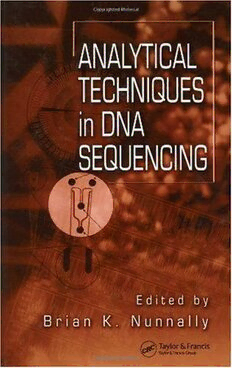
Analytical Techniques In DNA Sequencing PDF
250 Pages·2005·4.507 MB·English
Most books are stored in the elastic cloud where traffic is expensive. For this reason, we have a limit on daily download.
Preview Analytical Techniques In DNA Sequencing
Description:
While one marvels at the DNA generated by the Human Genome Project, perhaps just as significant and fascinating is the development of the amazing analytical technology that has permitted us entry into the genomic era and a whole new level of scientific understanding. Analytical Techniques in DNA Sequencing takes a look at the various DNA sequencing techniques that were developed and put to use during and after the Human Genome Project. Nunnally makes a special effort to trace the development of this branch of research since the early days of radioisotope sequencing. Special attention is paid to the breakthrough Sanger Method (1977), as well as to several other techniques that improved the accuracy, improved the detection limits, and in a variety of ways dramatically reduced the time needed to generate a DNA sequence. This comprehensive volume describes the improvements in DNA separation based on advanced capillary electrophoresis and microchip sequencing. It also looks at the use of mass spectrometry and single molecule detection, and takes an in-depth look at the use of various fluorescence methods for the detection of sequencing fragments. One chapter is dedicated to chip-based microfabricated sequencing systems, which could well be the future of DNA sequencing. The book’s ten chapters, authored by a variety of leading experts in the field, include many of the far-reaching applications of DNA sequencing. Entire chapters are dedicated to DNA typing for forensics, a reevaluation of ancient DNA, and genome analysis.
See more
The list of books you might like
Most books are stored in the elastic cloud where traffic is expensive. For this reason, we have a limit on daily download.
